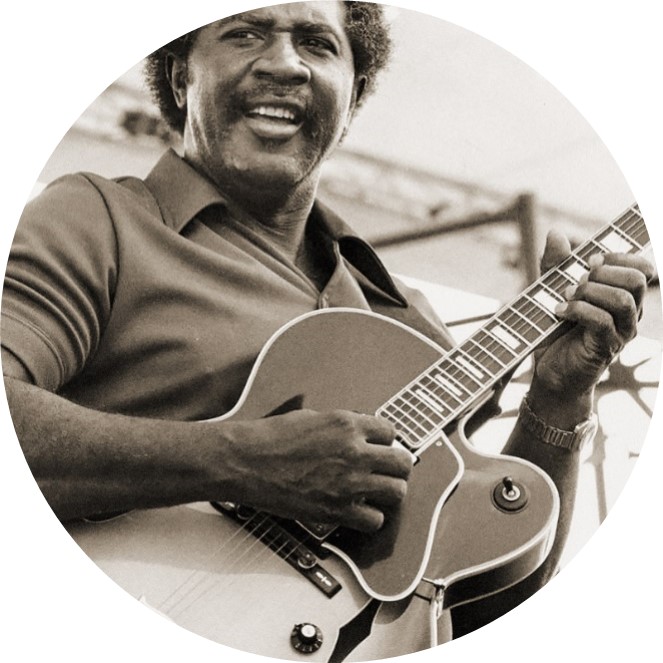 Fenton Robinson, practiced an erudite brand of blues hailed by musicians, critics and discerning audiences around the world, but rarely enjoyed the kind of wide public acclaim enjoyed by many high energy, hard-rocking blues performers. As Alligator Records’ Bruce Iglauer wrote, “In a world of barroom entertainers Fenton Robinson was a serious musician who is best appreciated with greater concentration than his audience usually gave him.”
Fenton Robinson, practiced an erudite brand of blues hailed by musicians, critics and discerning audiences around the world, but rarely enjoyed the kind of wide public acclaim enjoyed by many high energy, hard-rocking blues performers. As Alligator Records’ Bruce Iglauer wrote, “In a world of barroom entertainers Fenton Robinson was a serious musician who is best appreciated with greater concentration than his audience usually gave him.”
Robinson relocated to different cities several times trying to find his niche and had his moments of success and satisfaction, as a performer, songwriter and teacher. His 1967 masterwork “Somebody Loan Me a Dime” failed the hit the national charts but scored in Chicago, enough so that Robinson was recruited to compete with B.B. and Albert King, Bobby Bland and other heavyweights in a “Battle for King of the Blues” show at the Regal Theater in 1968. A 1969 rendition by Boz Scaggs with Duane Allman on guitar was the first of many cover versions. Robinson did the first waxing of the often-recorded standard “As the Years Go Passing By,” which he said was written by Peppermint Harris. “You Don’t Know What Love Is,” an Alligator album track, also inspired covers.
Born in Leflore County in the Mississippi Delta on September 23, 1935 (or a little before, according to various documents), Robinson began performing as a teenager in Memphis, where he teamed with guitarist Charles McGowan. He and McGowan moved to Little Rock and briefly to St. Louis. Robinson made his first records for the Meteor label in Memphis and Duke Records in Houston, playing with a harder electric attack than on his later Chicago records when he had developed a nimble, fleet-fingered technique influenced by T-Bone Walker’s style and by formal music studies. In addition to “As the Years Go (Passing) By,” his 1950s records (all credited to Fention Robinson) included “Tennessee Woman,” “The Freeze (made famous by Albert Collins) and, on a session backing Little Rock cohort Larry Davis, “Texas Flood” (later popularized by Stevie Ray Vaughan).
Robinson moved to Chicago in 1961 and established himself on the club scene, backing Junior Wells, Sonny Boy Williamson No. 2, Otis Rush and others and working his own gigs on the strength of singles he recorded for USA, Giant and Palos that showcased both his progressive guitar work and sensitive, soulful vocals. HIs debut LP on Nashville’s Sound Stage 7 label captured his talent as a vocalist but allotted little room for his guitar. His upward trajectory was blunted after a 1969 auto accident which eventually landed him in prison, but a letter-writing campaign from blues fans helped him earn an early release. He was based in Chicago in the 1970s, aside from a stay in Santa Cruz, California, where he landed after partnering on tour with Charlie Musselwhite. He recorded two critically acclaimed albums for Alligator, including the Blues Hall of Fame LP I Hear Some Blues Downstairs.
But his career in Chicago stagnated and he decided to move back to Little Rock, where he had been well received on return visits. Springfield, Illinois, where he had earlier taught blues in the schools, was his next residence, followed by Rockford, Illinois. Although he toured across the country and overseas, made further high-quality recordings, and was widely admired, high-echelon blues stardom eluded him. A philosophical thinker, serious reader and progressive musician, Robinson embraced the Islamic faith in the 1970s and once went under the name Fenton Lee Shabazz. A Japanese reissue LP honored him with the title The Mellow Blues Genius, and a British album designated him Mellow Fellow. He passed away from cancer in Rockford on November 25, 1997.
